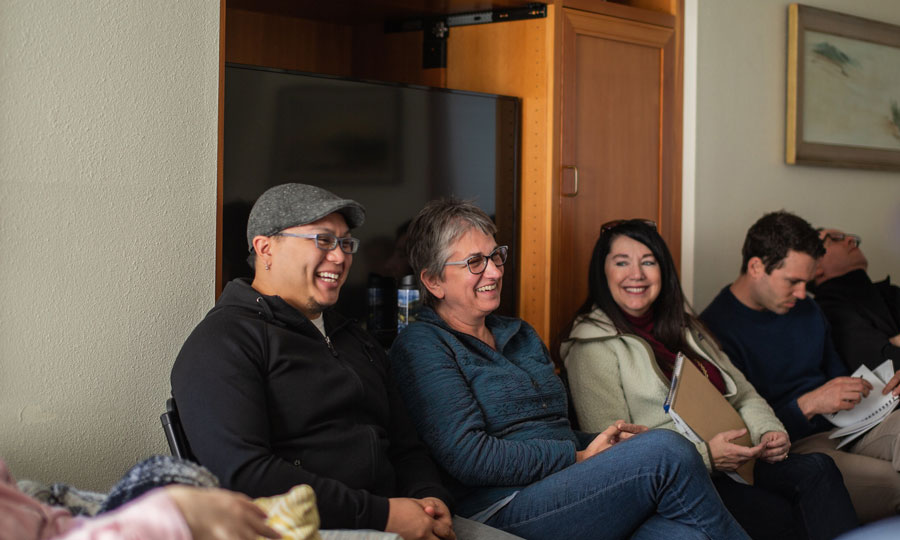
Which Seminary Masters Program is Right for You?
All programs are cohort based and include two in-person intensives with the exception of the MDiv program, which features three in-person intensives. Alternative program paces are available.
Programs
Master of Divinity (MDIV)
The Master of Divinity prepares you for the wonder and rigor of professional ministry. This degree cultivates fertile soil for life-long fruitful ministry through biblical scholarship, Christian history and theology, leadership skills, and practical pastoral training all rooted in your spiritual formation.
The MDiv includes six credit hours devoted toward one of two tracks stewarding leadership or chaplaincy. This degree is for those called to pastoral leadership, board-certified or military chaplaincy, or ultimately to apply to Doctor of Ministry programs.

Common vocational paths include:
- Ordained minister in the local church (certain denominations require an MDiv for ordination)
- Hospital, hospice, military or organization chaplain
- Teacher (private high school or university level)
Master of Arts in Ministry (MAM)
Built from the core of our established Master of Divinity curriculum, the Master of Arts in Ministry equips commissioned and non-ordained pastors for faithful, theologically grounded and practice-oriented ministry in today’s changing church landscape.
If you’re ready to realize your vision as a Christ follower and church leader, we’ll provide a flexible, affordable path to get you there. Whether you’re already pastoring, discerning a call, or serving in a lay role, this program will equip you with the biblical and pastoral training you need to lead congregations authentically and faithfully.

Common vocational paths include:
- Youth pastor
- Family pastor
- Associate pastor
- Parish associate
- Ministry director
Master of Arts in Theological Studies (MATS)
If you are passionate about research, writing, or teaching, our MA in Theological Studies is the program to consider. It features a required teaching internship as well as Greek and Hebrew language study options that prepare you for PhD work.
Two features which set our program apart are our teaching apprenticeship and built-in spiritual formation curriculum. Through these opportunities, our MATS students gain valuable masters-level teaching experience and integrate theological education with their own formation.
Though students who pursue the MATS often go on to pursue their PhD, we also have pastors, leaders and biblical enthusiasts who simply want to dive as deep as possible into biblical scholarship.

Common vocational paths include:
- Pastoral and lay Bible teaching
- Educational writing
- Academic research
- PhD candidacy
Master of Arts in Spiritual Formation (MASF)
The MA in Spiritual Formation degree program will prepare you to lead spiritual formation ministries in both individual and church community settings, as well as the broader community and world. Foundational courses are designed to form a Christ-centered identity through self reflection, biblical and theological engagement, and pastoral practice. Advanced courses will aid students in coming alongside others to promote healing and renewal.
Students interested in the degree often already find themselves drawn to the interior life and rhythms of spiritual practices. They also feel a distinct desire to help others explore and cultivate greater self-awareness and God-awareness and grow in Christlike character and mission.

Common vocational paths include:
- Formation and discipleship work within the local church (i.e.,women's, men's, youth, or children's ministries)
- Spiritual director (certification available to graduates)
- Nonprofit and parachurch ministry leader
- Artist using creative expression for spiritual formation
- Retreat facilitator
Program Distinctives
All of our seminary degree programs offer:
- Holistic learning: Explore theory and ideas but also learn practical applications
- Spiritual formation: Self-awareness and personal spiritual growth are foundational for sustainable, healthy ministry
- Diverse voices: Learn within an ecumenical community and from diverse faculty

Chantel Heister
Master of Arts in Theological Studies
I have been personally challenged to revisit some of my own paradigms and assumptions, which has created room to embrace new ways of thinking and experiencing God. This, in turn, has impacted my own work and how I see God moving in our midst, our classrooms, the courses we offer, and the conversations we host.